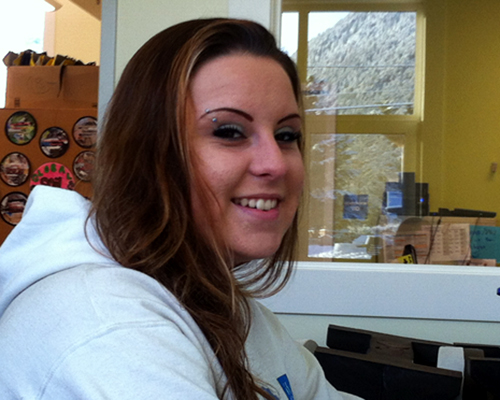
Veronica Nelson, 16, is in her third year at Pacific High School. She says teachers encourage students to work with people who have different strengths than their own. Photo by Anne Brice/KCAW
We all know that growing up can be tough. The pressure to fit in can be overwhelming; so can the feeling of isolation when you don’t. In the second part of KCAW’s series on teens and communication, 16-year-old Veronica Nelson takes us on a journey to self-acceptance that many adults could learn from. Through a class she took last year at Sitka’s alternative school called “Strong Women,” Nelson found exceptional strength in her own voice.
For parents, some of the themes discussed in this piece may be unsuitable for very young listeners.
Veronica Nelson is in 11th grade at Sitka’s alternative school, Pacific High. Last year, she took a course called “Strong Women,” led by staff from the local shelter, Sitkans Against Family Violence, or SAFV. In the class, they discussed stereotypes women deal with and how to be there for each other. Nelson says since the class, she’s seen many of the girls relax and be more comfortable with who they are.
“The harsh words and the constant jealousy and battle, I’ve seen that just completely drain away since last year,” she said. “Last year was my second year at pacific high, and after taking that class, I saw everybody dressing when they wanted to dress up, not dressing up everyday because they felt like they had to look better than everyone else.”
Each student in the class defined what it meant to her to be a strong woman. Nelson says women should be able to do any job they want, like be a firefighter or a high-powered executive, without feeling pressure to act like a man.
“I think that a strong woman is a woman who can live in a man’s world and still get to be a woman,” she said. “I think that as long as we can keep our feminine side and still get to have the jobs we want to have and be, I don’t want to say equal to men, but be equally in power.”
She says a strong woman is also someone who is proud and compassionate.
“Not being afraid to use her voice and not being afraid to fight for what she thinks is right,” said Nelson. “Also, being able to embrace other women around her and not constantly feel the need to compare herself or feel protective of herself around other women. I think that that’s a strong woman for me, and that’s what I strive for.”
Nelson is in a leadership group at school, and says they want teach younger kids the power of honesty and self-acceptance.
“Some of us want to go to the junior highs and the elementary schools and talk to the girls there, and ask them what a strong woman is to them,” she said. “I think it’d be adorable to hear like a third grader’s view of what a strong woman is. Just build on that, and teach them how not to be afraid to talk about certain things. If you can’t talk to your parents about it, then pick a woman you can talk to about it — your teacher, your counselor, someone who’s close to your family. It’s really important because not only are you being a leader for other people, you’re being a leader for yourself. If you can’t stand up for yourself, who can you stand up for?”
But Nelson says there was a time when she didn’t speak up, when she feels she should have.
“I started using and drinking when i was around 11 or 12, and I was raped when I was 13 when I was living down south. I had never talked about it. I thought it was OK. I thought that it was nothing. I thought that it was normal. I thought it happened to everyone when they were too drunk to defend themselves. Ever since I spoke up, I am so comfortable with being who I am and with talking about what happened to me.
It was just last year when she broke her silence.
“It was just before or during the strong women’s class that I spoke up about it to my grandparents and to the lady I was living with,” she said. “After that, I could just talk about anything and just feel happy and comfortable. I was going, ‘why didn’t I speak up for myself when I was 13? Why?’ It was because everything was so hush hush. You don’t talk about these things. You don’t do that. It’s just not something you talk about.”
Since she spoke up, Nelson says her peers feel more comfortable talking about their experiences, too.
“More girls in the class started speaking up about things that had happened to them,” she said, “and I think that’s when I started really realizing that all we have is each other. If we’re holding back all these things that happened to us, and we’re not sharing what someone else is going through, then we’re causing them to hold things inside of them.”
Nelson is inspired by the strength she’s discovered in herself, and interested in inspiring others. She’s taking a filmmaking class at Pacific High, where she’s making a video about drug and alcohol abuse in Sitka. It’s the story of her life as a recovering addict, and as a strong woman.
The filmmaking class is showing final projects on Wednesday, December 19 at 5:30 pm in Pacific High’s temporary quarters in the Southeast Alaska Career Center. It’s free of charge and everyone is welcome to attend. For more information, you can call the school’s front desk at 747.0525.































